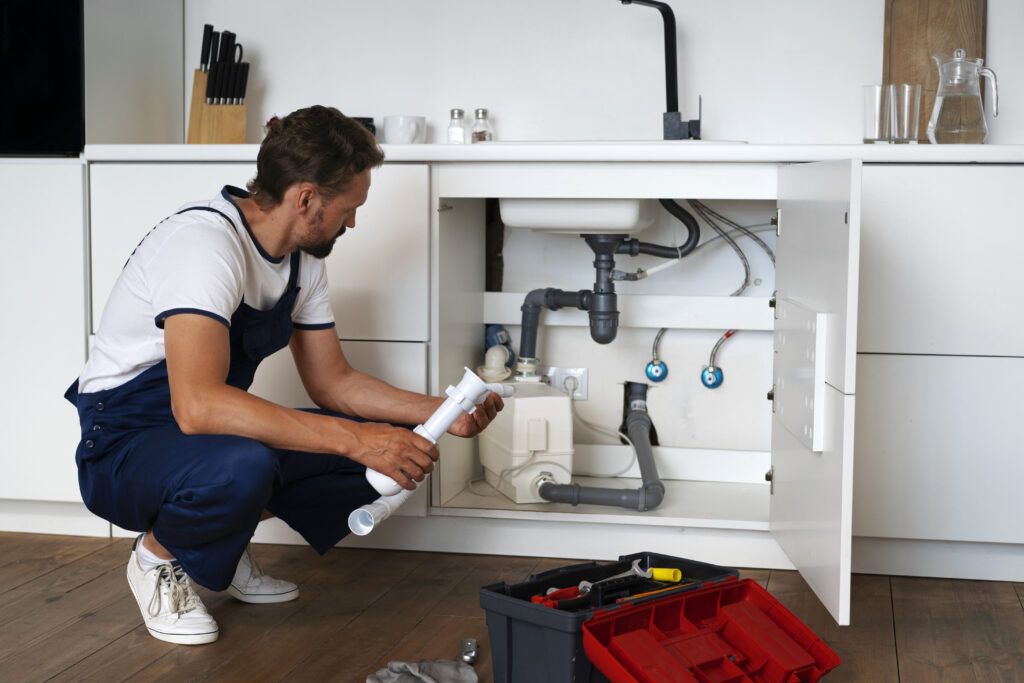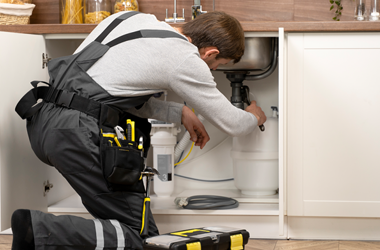Table of Contents
When planning a remodel or building a new home, many homeowners turn to general contractors to manage the entire process. These professionals handle a wide range of tasks, taking care of everything from framing and electrical work to construction and plumbing services. Since general contractor responsibilities often overlap with various trades, it is common for homeowners to ask whether plumbing jobs, especially those involving home renovation plumbing services, fall within the scope of general contractors. This blog takes a closer look at the common question of whether a general contractor can do plumbing and if they are the right choice for your project.
What Is a General Contractor?
A general contractor is someone you hire to manage a building or remodeling project. They take care of planning, scheduling, and making sure the job is done by the right people. Common general contractor responsibilities include organizing crews, ordering materials, and keeping the work on track. A licensed contractor is approved to handle many parts of a project, especially when it comes to residential construction work.
At LLC Contracting, our general contractors are trained to handle a variety of jobs including drywall services, remodeling services, house building services, painting services, and even slight plumbing services. We make sure you don’t have to juggle between multiple contractors for every new task, while offering reliable services for every job we undertake.

What Plumbing Work Requires a License?
Not all plumbing jobs are the same. Some are simple enough for a handyman, while others require expertise and must be done by a licensed plumber. Typically, any work that involves installing or altering pipes, water lines, or drainage systems usually falls under legal requirements for plumbing work. This includes jobs like installation and repair of plumbing systems, sewer and drain work, gas line installation and repair, and water heater installation and maintenance
To meet plumbing code compliance, licensed professionals must follow certain safety standards, which helps prevent leaks, water damage, and other serious issues. In most cases, building permits for plumbing are also required for larger jobs, and those permits can only be pulled by a licensed plumber. So, while some may ask, “do general contractors need a plumbing license”, the answer actually depends on the type of the work in question.
Can a General Contractor Do Plumbing?
Simply put, yes, a general contractor can do plumbing, but only within certain limits. The plumbing scope in general contracting usually covers simple and small tasks such as installing fixtures or repairing minor leaks. However, for anything beyond small repairs, like installing new pipes, working on gas lines, or changing drainage systems, a licensed plumber is required by law. This is because larger plumbing projects must meet specific safety standards and local codes.
In most states, plumbing work by a general contractor is only allowed if they also hold a plumbing license. If they do not, they are legally required to hire a licensed plumber to handle the work.
General Contractor Vs Plumbing Contractor
When planning a remodel, it helps to understand the difference between a plumbing contractor and a general contractor. A general contractor oversees the entire project, managing timelines, hiring subcontractors, and coordinating all parts of the job, including plumbing, electrical, and construction. However, they are not usually qualified to perform specialized tasks themselves unless they hold the required certifications.

A plumbing contractor, on the other hand, is a licensed professional who focuses specifically on plumbing systems. They are trained and certified to install, repair, and maintain water lines, drainage systems, gas lines, and more. So, who can do plumbing in a remodel? If the plumbing work is minor, a general contractor may be able to handle it. But for major installations or changes to your plumbing system, a plumbing contractor is not only the safer choice, it is often a legal requirement.
Conclusion
In a nutshell, general contractors have no trouble managing minor plumbing tasks, but when the job involves installing new systems, gas lines, or major repairs, the law typically requires a licensed plumber to ensure proper code compliance and safety. For simple plumbing needs, trust our skilled plumbers at LLC Contracting to help you with reliable and efficient plumbing services in Fredericton, Woodstock, Stanley, NB and surrounding areas.
Frequently Asked Questions – FAQs
-
What is the difference between a general contractor and a contractor?
A general contractor oversees an entire construction project, from start to finish, while a contractor (or subcontractor) performs a specific part of a project.
-
Is it better to use a general contractor?
Hiring a general contractor can relieve the stress of juggling budgets, timelines, tradespeople, and building code regulations when embarking on a major home renovation or construction project
-
How much do general contractors charge?
General contractors charge a 10% to 20% fee percentage of construction costs for large projects and a fixed, daily, or hourly rate for small jobs.
-
What is a plumbing contractor?
Their primary role is to install various plumbing systems in a construction project. This includes water supply systems, drainage systems, and sewer lines for residential and commercial properties.
-
What kind of plumbing can I do without a license?
Minor plumbing work like unclogging drains, fixing leaky faucets, or replacing showerheads typically does not require a license. However, anything that involves altering the existing plumbing system, like moving pipes, usually mandates a specialized plumbing license.

